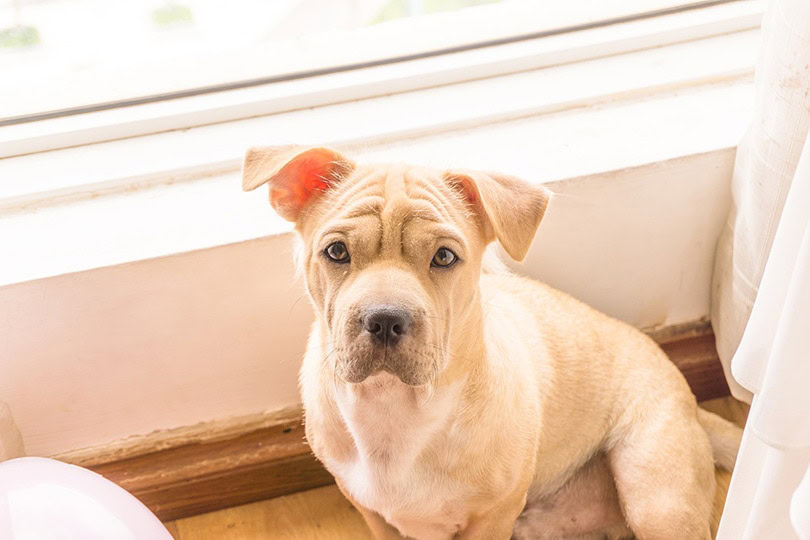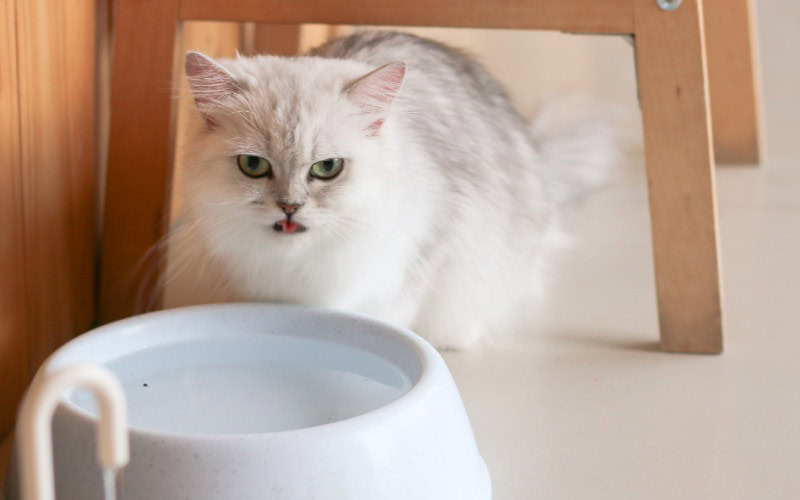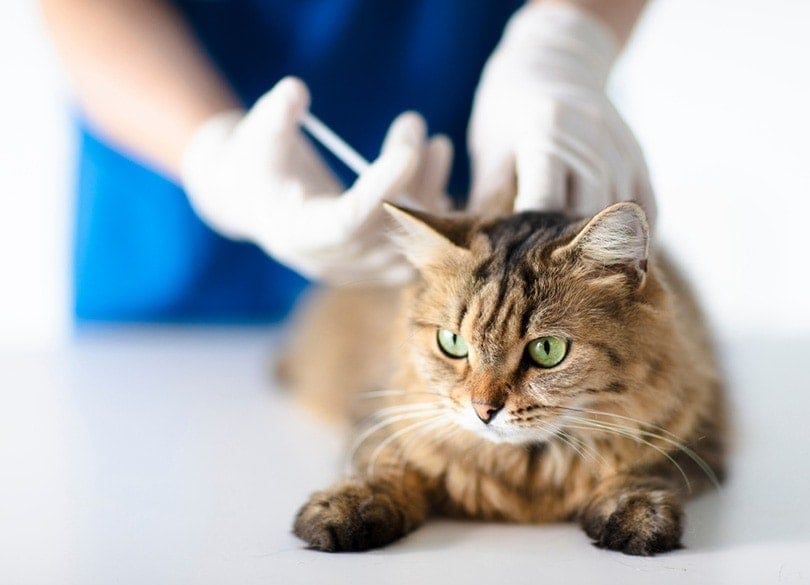VET APPROVED

The information is current and up-to-date in accordance with the latest veterinarian research.
Learn more »Your dog scarfs down their food so quickly that you’re not even sure they tasted it, and then they beg for more. Or, perhaps their meal is followed by constant scrounging or begging for your food. You’re feeding your dog the recommended amount of food, but they always seem to be hungry. What’s going on? Is your dog actually hungry? Are they just obsessed with food?
It could be a bit of both. Some dogs are genetically predispositioned to constantly look for food, but this is a learned behavior most of the time. Let’s look at why your dog is always looking for food and ways that you can reduce the behavior.

Is My Dog Really Hungry All the Time?
While it may seem like your dog is constantly starving, it’s unlikely that’s the case. Assuming that you are feeding them food that offers complete nutrition and has the appropriate amount of nutrients for your dog’s size, breed, and activity level, your dog is getting all the food that they need. In many cases, your dog has simply learned to beg for food. The reasons that dogs do this, though, are a little more complicated.
Rescued dogs that have been food deprived at some point in their life often become obsessed with finding food and develop a lifelong habit of gobbling up every morsel of food available. But even dogs that have been spoiled and pampered their whole lives beg for food. They have learned that begging results in getting a treat. This makes them happy, so they do it more often.
This accidental reinforcement of begging behavior is one of the reasons that so many dogs are overweight. We take pleasure in our pet’s happiness; food makes them happy, so we give it to them. Unfortunately, that isn’t healthy. Obesity can lead to a significant number of health issues in dogs, including diabetes, gastrointestinal disorders, and Cushing’s disease.
If you are concerned about your dogs weight, we suggest speaking to a feed to help you get your dog back on the right path.

The 4 Tips for Curbing Your Dog’s Appetite
Regardless of why your dog is begging, constantly overfeeding them is not the solution. Here are a few tips to employ to curb your dog’s seemingly insatiable appetite.
1. Cut back on the treats
This may seem counterintuitive, but if your dog has learned to expect treats all the time, it is time to help them unlearn the behavior. If you use treats as rewards for good behavior or training, try using something else that your dog loves. This could be petting, snuggling, playing a game of fetch, or giving them positive attention.
You can continue to feed your dog treats; just make the schedule less predictable. It also helps to make sure the treats are nutritious and low in fat and calories.
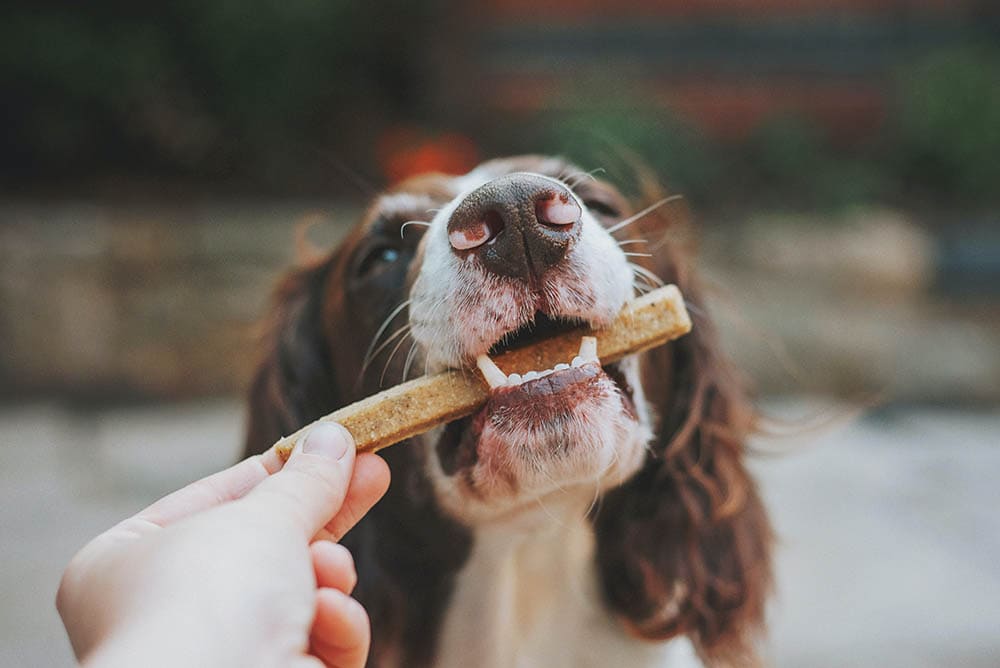
2. Feed the proper amount of food
Just because your dog will eat four meals a day doesn’t mean they should. If you’re unsure how much food to feed your dog, talk to a vet to develop a nutrition plan that’s appropriate for your dog’s breed, size, age, and activity level. Then, feed them the appropriate portion sizes and stick to it.
3. Meet your dog’s needs
If you have a highly active dog, they may need more food in general or a sports food that offers them more calories per meal.
Senior dogs have a slower metabolism than younger dogs, and their bodies become less efficient at digesting certain foods. As dogs age, they have different needs, so make sure their food meets those needs.
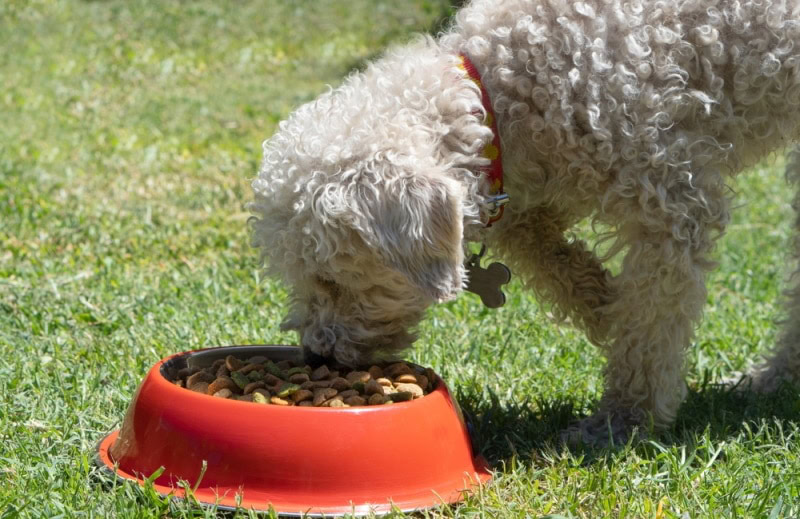
4. Choose quality over quantity
Many dog foods have extra fiber or filler ingredients added to bulk up the food. Unfortunately, these fillers don’t always provide added nutrition and may pass unabsorbed through your dog’s digestive system. Excessive processing can also damage some of the nutrient content in food, so the more processed your dog’s food is, the less nutrition it may offer.
There are many dog food options that offer complete nutrition and quality ingredients at a reasonable price. Having healthy food that provides the vitamins and nutrients that your dog needs will help them feel less hungry.

When It’s Not a Behavioral Issue
There are a few occasions where your dog’s voracious appetite isn’t a behavioral issue. Some medical conditions can cause a sudden increase in appetite. If your dog is normally a picky eater that self-regulates their food intake and they are suddenly eating everything in sight, it may be time for a check-up.
- Bacterial overgrowth in the intestines
- Diabetes
- Cushing’s Disease
- Exocrine pancreatic insufficiency
- Hyperthyroidism
- Medication reaction
The mechanism of hunger in all these conditions is the dog’s inability to absorb nutrients from their food. Their appetite kicks into overdrive as their body seeks to correct the imbalance. Unfortunately, without the physical problem being treated, their body is still starving for nutrition, no matter how much food they eat.

Final Thoughts
In most cases, constantly begging for food is a learned behavior that can be fixed with a few alterations in your routine and your dog’s diet. If your previously picky dog is suddenly hungry all the time, this could indicate a medical condition that requires treatment. Many dogs are naturally programmed to overeat, which can lead to problems if you don’t prevent it. Feeding your dog a healthy diet that meets their unique needs and avoiding bad eating habits will help keep your dog healthy and prevent long-term problems.
Featured Image Credit: Leohoho, Pixabay
